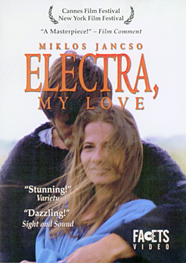| Release List | Reviews | Price Search | Shop | Newsletter | Forum | DVD Giveaways | Blu-Ray/ HD DVD | Advertise |
| Reviews & Columns |
|
Reviews DVD TV on DVD Blu-ray International DVDs Theatrical Reviews by Studio Video Games Features Collector Series DVDs Easter Egg Database Interviews DVD Talk TV DVD Talk Radio Feature Articles Columns Anime Talk DVD Savant HD Talk Horror DVDs Silent DVD
|
DVD Talk Forum |
|
|
| Resources |
|
DVD Price Search Customer Service #'s RCE Info Links |
|
Columns
|
 |
Electra, My Love
|
||||
The packaging text for Electra, My Love has some rather impenetrable praise for this bizarre film, calling it 'an awesome leap of the imagination', and 'unlike any other film you have ever seen'. It definitely is special, but probably not one of a kind, as Hungarian filmmaker Miklós Jancsó has made quite a few pictures in a similar style. The Red and the White was a sweeping panorama of civil war, a chaos of action on a vast plain made all the more breathtaking for being shot in what seem like endless moving takes. The realistic action is arrayed for the camera in five and six-minute bursts of activity, like a pageant that appears to become real. Electra, My Love isn't realistic at all, but a completely artificial and stylized rethinking of Greek legend that is nine parts dance and one part story. Jancsó's clockwork patterns of people move in rhythmic patterns and synchronize with his gliding camera like fine clockwork - this is what a Greek play might look like, if filmed by Busby Berkeley.
Electra moves along a line of wispily-attired maidens, telling of the injustice of the king. Behind, ranks of cavalrymen move on horseback. Sweeping left, we move down a diagonal line of men cracking long black whips in unison. Electra re-enters and circles a statue-like grouping of nudes. Musicians re-direct our gaze off to the left, until dancing people appear on cue over a small hill. There are cuts in Electra, My Love, but almost all of the story is composed of these pageant-like master shots, each of which must have been rehearsed like dance theater for days, before being filmed. The camera stays more or less at eye-level, and avoids extreme motions. It glides calmly, finding new compositions in the constantly-changing patterns of people and props. It is very much like a Greek play, with minimalist costumes (the nudity is frequent, but aesthetically asexual) and characters who strike poses and speak their lines directly to the camera. The visuals are impressive, but the story is hard to follow. Electra complains, the bad king threatens but doesn't kill her, a messenger brings bad news and is murdered, and then the lost brother Orestes appears. He looks exactly like the messenger (?) and somehow takes back the kingdom. It doesn't seem to follow the usual events laid out in old accounts, with the involvement of Electra's mother Clytaemnestra, and sister Iphegenia. After the 'revolution', the story ends, but the celebratory pagentry continues. Mourning becomes Electra, but she smiles a lot in the last reel or so. Some scenes are totally opaque, and we just enjoy the constantly-changing visual patterns. Others, as when the king's subjects are told to criticize him, yet offer up only sycophantic praise, are easy to understand. (spoiler) The ending is simply strange, when a red helicopter picks up the newly-reunited brother and sister, flies around, and brings them back to Earth once more. Is Electra's revenge on her usurpers a fantasy? Is the story taking place in her fevered mind? This is an art film that has more to do with the graphic manipulation of living scenery and the convoluted permutations of patterns in movement - a combination of dance and camerawork. It really can't be appreciated much as a story. Facets Video's DVD of Electra, My Love is a good pressing of a bizarre Art film from Eastern Europe. Those already familiar with the work of Miklós Jancsó will know what to expect, if they can picture an even more formalistic and stylized version of his previous historical pageants. The color is good, but the framing looks as though it might be a slightly cropped fullscreen adaptation of a 1:66 original. Things can look tight on the sides, even the titles. For such a graphically precise film, this could be an important issue. The English subtitles are not removable. Any kind of text supplement to let us in on the director's aims would have been a plus, but the only extra is a set of interesting production stills.
On a scale of Excellent, Good, Fair, and Poor,
Electra, My Love rates:
Review Staff | About DVD Talk | Newsletter Subscribe | Join DVD Talk Forum |
|
| Release List | Reviews | Price Search | Shop | SUBSCRIBE | Forum | DVD Giveaways | Blu-Ray/ HD DVD | Advertise |






